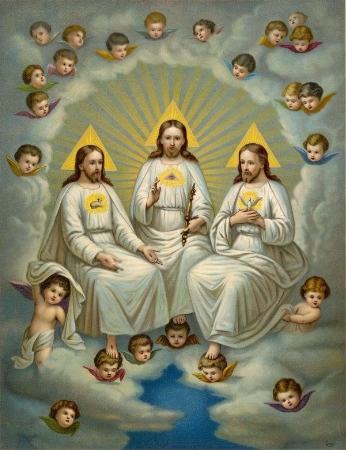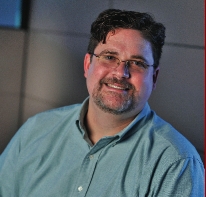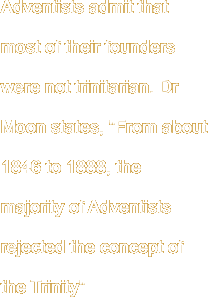HOME / PROCLAMATION! MAGAZINE / 2012 / SUMMER / ADVENTISM EXAMINED WITH RICK BARKER
S U M M E R • 2 0 1 2
VOLUME 13, ISSUE 2
D E P A R T M E N T S
Adventism EXAMINED with Rick Barker
![]()
![]()
Fundamental Belief #2. The Trinity: There is one God: Father, Son, and Holy Spirit, a unity of three co-eternal Persons. God is immortal, all-powerful, all-knowing, above all, and ever present. He is infinite and beyond human comprehension, yet known through His self-revelation. He is forever worthy of worship, adoration, and service by the whole creation.
W hen I first heard critics say that Adventism was tritheistic rather than truly Trinitarian, I thought they were overreacting. Now, several years later, I have come to the same conclusion after many discussions with Adventist apologists on online forums.
The term Trinity has a very specific meaning within Christianity. The word was created by the Christian Church in order to describe a specific belief. Trinity comes from the Latin word trinitas and it means "three in one". The creation of the word "Trinity" is linked to the theological understanding of the Christian Church when forming the word. The orthodox Christian belief, then and now, is that while God exists as three distinct persons, God is still One Being. Seventh-day Adventists do not use this definition of the word.
Dr. Jerry Moon, perhaps the foremost Adventist scholar on this subject, describes the Trinity in this way: "Unlike the multiple gods of polytheism, the three persons of the biblical Godhead are profoundly 'one in purpose, in mind, in character, but not in person.' Thus, despite their individuality, they are never divided, never in conflict, and thus constitute not three gods, but one God."1 The quote within this statement is directly from Ellen White—and demonstrates, parenthetically, that she is being used to define doctrine. Moon develops his thesis that the traditional Christian Trinity is not biblical; rather, Ellen White's "heavenly trio" is the correct doctrine.
Arian roots
Adventists admit that most of their founders were not trinitarian. Dr Moon states, "From about 1846 to 1888, the majority of Adventists rejected the concept of the Trinity"2 In 1855, J. N. Andrews, the namesake for the university that houses the Adventist theological seminary, wrote, "The doctrine of the Trinity… was established in the church by the council of Nice, A. D. 325. This doctrine destroys the personality of God, and his Son Jesus Christ our Lord. The infamous measures by which it was forced upon the church which appear upon the pages of ecclesiastical history might well cause every believer in that doctrine to blush."3 James White plainly expressed that he did not believe that Jesus was co-eternal with the Father: "…the old unscriptural trinitarian creed, viz., that Jesus is the eternal God."4 As late as the 1919 Bible Conference L. L. Caviness stated "It (divine glory) was not something he (Jesus) had all through eternity, but the Father had some time given to him the glory of God. He is divine, but he is the divine Son. I cannot explain further than that, but I cannot believe the so called Trinitarian doctrine of the three persons always existing."5
Ongoing heresy
Today, Jerry Moon endorses at least part of the Adventist founders' view: "Since the traditional doctrine of the Trinity clearly contained unscriptural elements, they rejected it."6
Because of these early Arian views and because of Ellen White's conclusion that the Trinity is a "heavenly trio" (as examined in Moon's paper), Adventists have concluded that the view that Christ is "co-eternal with the Father" and "equal to the Father" without asserting the three Persons are of the same substance is Trinitarianism.
The most recent Adventist Hymnal, published in 1985, includes hymns that have been re-written to remove references to the Trinity.7 The Bible paraphrase published by the Adventist church publishing house rewords a number of passages related to the Trinity.8 Adventist theologians continue to proclaim the orthodox doctrine of the Trinity as unbiblical.9
This Adventist trinity is not the Christian doctrine of the Trinity. Instead, it redefines "Trinity" to fit the legacy of its founders and Ellen White's pronouncement.
The Adventist church cannot honestly refer to itself as Trinitarian. †
Endnotes
- Moon, Jerry, "The Quest for a Biblical Trinity: Ellen White's "Heavenly Trio" Compared to the Traditional Doctrine" www.atsjats.org/publication_file.php?pub_id=241&journal=1&type=pdf
- The Adventist Trinity Debate (2003) Andrews University Seminary Studies, Vol. 41, No 1, 113-129.
- March 6, 1855, Review & Herald, vol. 6, no. 24, page 185.
- The Day-Star, January 24, 1846, 25.
- 1919 Bible Conference and Teachers Council Minutes, www.swordofelijah.org/english/1919BibleConference.pdf
- Moon, ibid.
- Tinker, Colleen and Richard; Pitcher, Stephen, "Tell Me The Old, Old Story", Proclamation! Jan/Feb., 2005, p. 8. www.lifeassuranceministries.org
- Pitcher, Stephen, "Is This Word Clear?", Proclamation! Jan/Feb., 2009, p. 6. www.lifeassuranceministries.org
- www.cultorchristian.com/sdaadmissions.html

Copyright 2012 Life Assurance Ministries, Inc., Casa Grande, Arizona, USA. All rights reserved. Revised July 2, 2012. Contact email: proclamation@gmail.com

Rick Barker is a native of Southwestern Ohio and facilitates a weekly Bible study for former and transitioning Adventists in the Dayton, Ohio, area. Rick graduated from Andrews University in 1987 and received a Masters degree from the University of Dayton. Rick and his wife Sheryl formally left the Adventist chuch in 2004. Prior to this they had been active in the Miamisburg and Wilmington, Ohio, churches. They currently attend Living Waters Lutheran Church in Springboro.

